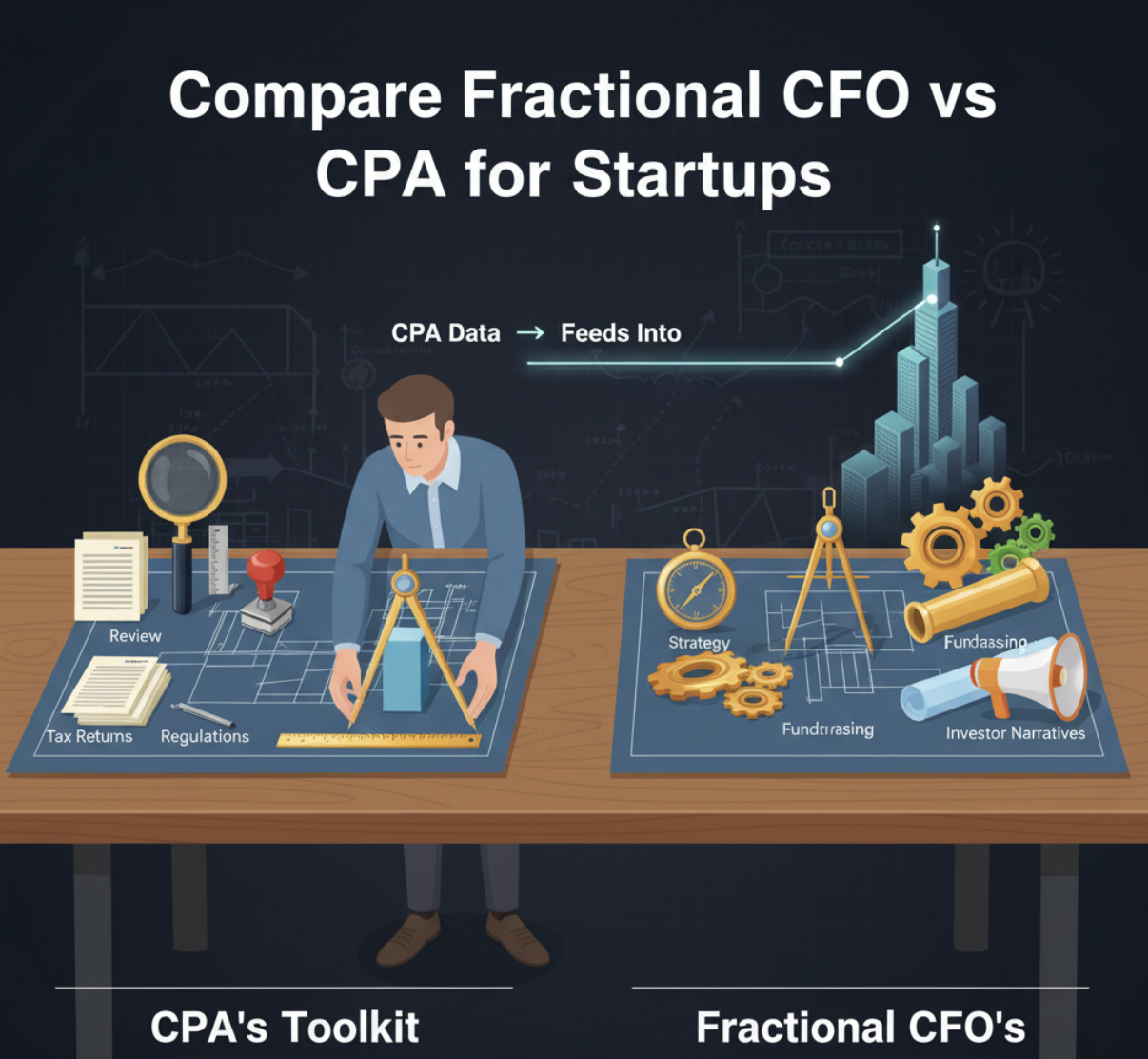Introduction: Why Startups Struggle With Finance Leadership
If you’re a startup founder, you’ve likely asked yourself: Do I need a CFO, or is a CPA enough? Managing money isn’t just about keeping books balanced. It’s about building a financial strategy that helps you scale, attract investors, and prepare for what’s next.
Many founders confuse the roles of a CPA (Certified Public Accountant) and a fractional CFO (Chief Financial Officer). Both are valuable—but they bring very different skills to the table. Let’s break it down.

Fractional CFO vs CPA: What’s the Difference?
Here’s a quick side-by-side comparison:
| Aspect | Fractional CFO | CPA |
|---|---|---|
| Primary Focus | Strategic leadership and financial growth planning | Compliance, tax preparation, and auditing |
| Key Deliverables | Forecasting, investor readiness, M&A support, cash flow management | Financial statements, tax filings, audit reports |
| Engagement Type | Fractional, project-based, ongoing executive input | Often transactional or periodic engagements |
| Value to Startups | Helps scale, raise capital, optimize business model | Keeps you compliant and avoids penalties |
| Cost Range | Higher, but flexible via fractional model | Moderate, hourly or fixed-fee basis |
Both roles matter—but if you’re aiming to grow strategically, the fractional CFO brings vision beyond compliance.
When Startups Should Hire a CPA
A CPA is essential when your business needs:
- Annual tax filings and compliance
- Accurate, audit-ready financial statements
- Assurance you’re meeting state and federal financial regulations
- Bookkeeping oversight
Think of a CPA as your guardian of compliance. They keep you legally sound—but they don’t typically drive growth strategy.
When Startups Should Hire a Fractional CFO
A fractional CFO is critical when your business is:
- Preparing to raise venture capital
- Scaling operations and needing advanced cash flow management
- Planning for an acquisition, merger, or exit strategy
- Developing financial models to guide decision-making
- Building investor-ready pitch decks and financial narratives
Fractional CFOs act as strategic partners, helping you make informed choices about hiring, marketing spend, expansion, and risk management.
How Fractional CFOs and CPAs Work Together
In the best-case scenario, your startup leverages both:
- The CPA ensures compliance, clean books, and proper filings.
- The fractional CFO translates that data into strategies for growth.
This combination keeps you both compliant and competitive.
Leveraging AI to Get More Out of Your Finance Leaders
Modern fractional CFOs and CPAs aren’t just crunching numbers—they’re using AI to streamline workflows:
- AI-driven forecasting for more accurate projections
- Automated dashboards for real-time financial visibility
- Prompt engineering to create financial scenarios faster (explore prompt libraries here)
- Due diligence checklists automated for M&A readiness (see full checklist)
EJ Bowen’s AI resources provide tools to integrate these capabilities seamlessly into your financial strategy.

FAQ: Fractional CFO vs CPA
1. What’s the main difference between a fractional CFO vs CPA?
A fractional CFO drives strategy and growth, while a CPA ensures compliance and accurate reporting.
2. Can a CPA act as a CFO for my startup?
Not usually. CPAs specialize in compliance and accounting, while CFOs provide leadership, financial modeling, and investor strategy.
3. Is hiring a fractional CFO expensive for startups?
Fractional models are cost-effective—you only pay for the level of executive input you need.
4. Do I need both a CPA and a fractional CFO?
If your business is growing quickly, yes. The CPA keeps you compliant, while the CFO ensures you scale smartly.
5. How can AI help my CFO or CPA?
AI tools improve forecasting, automate reporting, and help create investor-ready documents faster.
Final Thoughts: Choosing the Right Fit for Your Startup
If your goal is stability and compliance, a CPA is your best first hire. But if you want to scale, raise capital, or prepare for exit, a fractional CFO gives you the strategic edge.
At NeoGig, we connect startups with experienced fractional CFOs who can work alongside your CPA to ensure you’re both compliant and ready for growth. Explore NeoGig’s executive talent solutions today.







